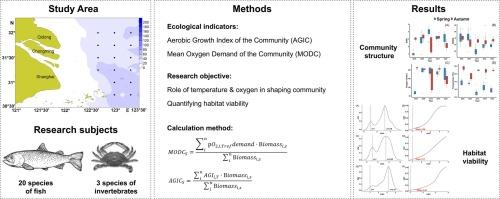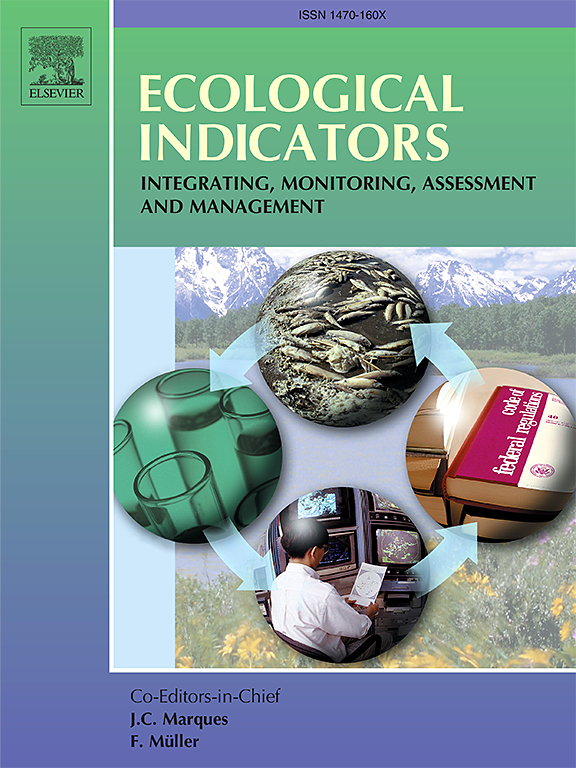长江口鱼类和无脊椎动物群落结构及生境活力的时空变化
IF 7
2区 环境科学与生态学
Q1 ENVIRONMENTAL SCIENCES
引用次数: 0
摘要
温度和氧气是影响群落结构的基本环境因素,也是全球海洋物种面临的主要气候压力因素,它们与物种的生理特征相互作用,建立起海洋栖息地。温度和氧气的周期性季节波动极大地影响了群落结构的组成和生物地理栖息地的生存能力。本研究利用两种基于群落的指数--群落有氧生长指数(AGIC)和群落平均需氧量(MODC)--来了解温度和氧气在长江口春秋两季底栖鱼类和无脊椎动物群落结构形成中的作用,并量化不同季节和空间区域的栖息地活力。我们观察到长江口的环境和群落结构存在明显的季节性差异,但不同季节的栖息地活力差异很小。秋季群落对缺氧的脆弱性较低,恢复力较强。尽管如此,从 2004 年到 2022 年,除 2004 年春季外,气温、含氧量和栖息地活力的年度波动很小,总体保持在较高水平。此外,受台湾暖流影响,长江口南部地区的生境活力低于北部地区。AGIC和MODC作为两个新的生态指标,虽然存在一定的不确定性,但在目前全球氧气危机的情况下,仍能为今后河口生态系统的保护和渔业资源的可持续利用提供指导。本文章由计算机程序翻译,如有差异,请以英文原文为准。

The spatiotemporal changes in fish and invertebrate community structure and habitat viability in the Yangtze Estuary
Temperature and oxygen are fundamental environmental factors shaping community structure and are major climatic stressors for marine species globally, interacting with physiological traits of species to establish marine habitats. Periodic seasonal fluctuations in temperature and oxygen significantly influence the composition of community structures and biogeographic habitat viability. This study utilized two community-based indices, the Aerobic Growth Index of the Community (AGIC) and the Mean Oxygen Demand of the Community (MODC), to understand the roles of temperature and oxygen in shaping the community structure of benthic fish and invertebrates during the spring and autumn in the Yangtze Estuary and quantified habitat viability across different seasonal and spatial regions. We observed pronounced seasonal differences in the environmental and community structures of the Yangtze Estuary, though variations in habitat viability across seasons were minimal. Autumn communities demonstrated lower vulnerability and higher resilience to hypoxia. Despite this, from 2004 to 2022, the annual fluctuations in temperature, oxygen levels, and habitat viability were minimal, maintaining high levels overall, except in the spring of 2004. Additionally, influenced by the Taiwan Warm Current, the southern region of the Yangtze Estuary exhibited lower habitat viability compared to the northern region. Although AGIC and MODC, as two new ecological indicators, are limited by some uncertainties, it can still provide guidance for future conservation of estuarine ecosystems and sustainable utilization of fishery resources under the ongoing global oxygen crisis.
求助全文
通过发布文献求助,成功后即可免费获取论文全文。
去求助
来源期刊

Ecological Indicators
环境科学-环境科学
CiteScore
11.80
自引率
8.70%
发文量
1163
审稿时长
78 days
期刊介绍:
The ultimate aim of Ecological Indicators is to integrate the monitoring and assessment of ecological and environmental indicators with management practices. The journal provides a forum for the discussion of the applied scientific development and review of traditional indicator approaches as well as for theoretical, modelling and quantitative applications such as index development. Research into the following areas will be published.
• All aspects of ecological and environmental indicators and indices.
• New indicators, and new approaches and methods for indicator development, testing and use.
• Development and modelling of indices, e.g. application of indicator suites across multiple scales and resources.
• Analysis and research of resource, system- and scale-specific indicators.
• Methods for integration of social and other valuation metrics for the production of scientifically rigorous and politically-relevant assessments using indicator-based monitoring and assessment programs.
• How research indicators can be transformed into direct application for management purposes.
• Broader assessment objectives and methods, e.g. biodiversity, biological integrity, and sustainability, through the use of indicators.
• Resource-specific indicators such as landscape, agroecosystems, forests, wetlands, etc.
 求助内容:
求助内容: 应助结果提醒方式:
应助结果提醒方式:


